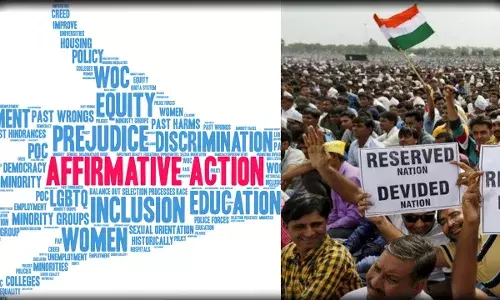With significant quotas set aside for the marginalised, the majority must face the brunt of constricted and, as a result, extremely competitive vacancies and posts, resulting in many deserving individuals missing out on academic and career possibilities. If Patels from the business community are concerned about losing their employment or being unable to find work at all, it says volumes about India’s reverse discrimination. What is Reverse Discrimination? Simply put, reverse discrimination occurs when the majority feels discriminated against as opposed to the minority.
How can we deal with such a ridiculous situation that makes a mockery of our democratic country- Either the Patels are given reservation powers or the reservation system, which was only designed to be temporary, is abolished entirely. Whether the Patels’ claim is justified or not, it is worth noting that, while the minority was discriminated against in the past, the majority has been discriminated against recently. This shortcoming in affirmative action must be addressed so that the democratic government of India does not feed the flames of reverse discrimination in its efforts to abolish discrimination.
Brain Drain
This is the most visible result of India’s identity politics. The public feels challenged, undermined, and even rejected as a result of reservations and quota-based systems, as job and educational selections are based on Caste rather than Merit. As a result, India’s intellectuals are obliged to work overseas, and the phenomenon of Brain Drain continues to deplete India’s think tanks, learned scholars, and intellectuals.
Against Constitution
If the constitution seeks for an egalitarian society in which everyone has equal rights regardless of caste, colour, or faith, then the instance of preferential treatment as indicated by affirmative action legislation may/will appear to be a double standard. As a result, Affirmative Action on the basis of race is considered illegal in many nations, but not in India.
Creamy Layer
Even among the poorest castes, such as the OBCs, economic differences have been observed. The well-off sectors of a community typically take the reservations, while the destitute stay impoverished and unable to use the welfare programmes designed to help them. To combat this behaviour, India implemented the creamy layer concept, under which the higher and middle parts of OBCs are not eligible for reservations, providing poor OBCs access to government welfare programmes. In this system, members of low castes who have advanced in educational and occupational circles will not be considered marginalised and will be able to compete with the majority without the assistance of reservations.Concurrently, the poor castes can benefit.At the same time, the poor castes can profit from the quota system and eventually become self-sufficient in terms of reservations.
Figuring out an idealistic or practical charting and execution of Affirmative Action is both contentious and delicate. However, it may be accomplished by listening to what the public has to say about it; by considering the numerous objections to it, proposed revisions, and public expectations, one can arrive at a unified conclusion on how Affirmative Action should be implemented.
Need For India To Debate On Caste Quota
In 2019, when Prime Minister Narendra Modi’s BJP-led government proposed reserving 10% of government jobs and seats in educational institutions for economically backward upper caste citizens who earn less than 800,000 rupees ($11,500) per year and own less than five acres of land.
Few MPs objected to this action because all parties are participating in exploiting caste to distribute patronage. The lower house passed a bill amending the constitution to allow for the new quotas in a record 48 hours. It was passed later by the upper house.
The timing of the move appears to be questionable, which proved to be helpful for BJP and thereby one of the reasons for BJP to have a landslide victory in 2019 elections
The Shortcomings of the Affirmative Action In India
Affirmative action has been made ineffectual as a weapon of empowerment for those oppressed by the caste system as it stands now. In essence, the constitution’s sensitivity to caste does little to confront it as a philosophy of social organisation and identification, which is at the heart of tyranny.
The societal institution of marriage by arrangement preserves caste consciousness more than any other. The continuation of caste-based marriages has maintained segregation for millennia, with favoured castes controlling the privileges that result from it. Caste remains tight in the absence of inter-caste weddings (only 5.8% of Indian marriages were inter-caste according to the 2011 Census), with upper-caste individuals refusing to abandon their identity. “The notion is that they are terrorists who revolt in society,” Ravindra Parmar said of his inter-caste marriage (he is a Dalit man marrying an upper-caste woman) in Indian society. While inter-caste marriages are theoretically protected, the purposeful practice of matching castes for marriage is almost criminal.
Because caste operates in areas of life where the state finds it difficult to engage – most notably social interactions – overcoming it will necessitate methods other than affirmative action. Except in the instance of caste, there is an active individual and community effort among persecuted identifiers to oppose and abandon stigmatising ideas such as misogyny, racism, xenophobia, and nativism. The acceptance of caste is commonplace in everyday life. While the founding fathers created a strong constitutional foundation for a casteless society, achieving that aim needs a concerted effort to renounce all caste identities, rather than depending on half-hearted affirmative action measures.
As an independent media platform, we do not take advertisements from governments and corporate houses. It is you, our readers, who have supported us on our journey to do honest and unbiased journalism. Please contribute, so that we can continue to do the same in future.

